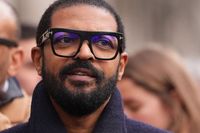Noel Clarke, the 49-year-old actor best known for his role in Doctor Who, is embroiled in a serious legal battle as he faces multiple allegations of misconduct made by several women, including claims of sharing intimate photographs without consent. The High Court proceedings, which began on March 20, 2025, have revealed shocking testimonies from women who have described feeling humiliated and exploited during their professional interactions with Clarke.
One key figure, a woman known only as Ivy, testified that she was "horrified" to discover that intimate photographs she sent to Clarke during a brief relationship had been shown to others without her consent. Ivy explained how, trusting Clarke while he was still married, she sent him nude photos with the belief that he would respect her privacy. "Trusting him, I consensually sent him a small number of nude photos of myself. I remember that I expressly told him that he should not show them to anyone," she said. However, many years later, Ivy learned Clarke had been discussing their relationship and sharing the photos, which left her feeling deeply disrespected.
Such allegations are part of Clarke's libel suit against the Guardian News and Media (GNM), over seven articles and a podcast that reported on similar claims made by multiple women. Ivy is among at least 20 women who have come forward alleging misconduct against Clarke, asserting that GNM's reports are in the public interest and true. The actor has publicly denied the allegations, asserting that any photographs taken were consensual and kept private.
Ivy's testimony continued as she expressed her fear of Clarke’s leverage over her, stating, "Just because I didn’t vocally fall out with him, it doesn’t mean I didn’t lose respect for him a long time ago." The idea that Clarke had shown her photos to others left her in disbelief. Even when probing her former relationship with him, Ivy noted, "They exist out in the world, and I didn’t send them, so someone did." These statements encapsulate the sense of betrayal and manipulation that Ivy felt as she navigated a vulnerable moment in her life.
In addition to Ivy, actress Mila also testified about her uncomfortable experiences working with Clarke. According to Mila, during a scene that required nudity, Clarke allegedly made inappropriate comments, ordering her to bend over and sit on his lap. In her witness account, Mila mentioned, "Noel was telling me to bend over… I was clearly very uncomfortable and resisting." Feeling humiliated and powerless during the filming process, Mila's experience raises alarms about the power dynamics within the industry, where actors may often lack the autonomy to voice their discomfort.
After their work together, Mila indicated that Clarke later reached out to her, offering an apology that she described as panicked. "He seemed ‘panicked’ on the call... either fishing to see whether I was unhappy or trying to cover his tracks in some way," she remarked. Clarke has denied Mila’s allegations, claiming that her recounting of events is exaggerated and distorted.
Clarke's charges were compounded by testimony from Davie Fairbanks, a former friend who claimed Clarke had shared intimate photographs of Ivy with him after they had been intimate. Fairbanks stated, "Noel took photos of Ivy in the hotel room when they slept together... he asked me to save the photo and to put it into a new email to send back to him straight away, and to then delete the original email." Fairbanks adjusts his testimony, ensuring he followed Clarke’s directives, which raises ethical concerns surrounding the sharing of such images.
Despite Clarke's defense asserting that he never passed around these images, Ivy's horror at the situation remains palpable. When prompted about the existence of photographs that made their way back to Fairbanks, she commented, "I didn’t vocally fall out with him... I trusted him with my personal life, and he disrespected that trust by showing pictures of me to others without my consent." This complicity in obscuring the truth about their interactions suggests an industry grappling with its own flaws while trying to address accusations of misconduct.
In expansive detail, rapids of testimonies highlight a pattern of behavior that has serious implications—both for Clarke and for the broader entertainment domain that struggles with the lines of consent and respect. The trial, presided over by Mrs Justice Steyn, is expected to continue into April, with a verdict likely forthcoming as revelations about Clarke's alleged behavior trial draw the public interest.
The courtroom proceedings continue to unearth layers of complexity surrounding Clarke, his relationships with women, and the media's role in amplifying voices that often go unheard. As advocates for change continue to push for accountability within industries plagued by the specter of misconduct, this case might serve as a pivotal moment in confronting toxic operational cultures that allow such behaviors to flourish.
As the public awaits a verdict, Clarke's legacy hangs in the balance, shaped not only by his artistic contributions but also by the weight of these serious allegations. The court's decision will signal what accountability looks like in the realms of both celebrity and victim rights.






